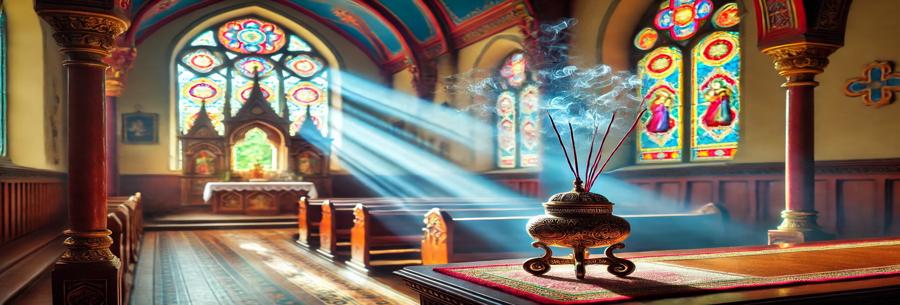Church incense has played an essential role in Christian religious ceremonies for centuries. More than just a perfume, it is charged with profound spiritual meanings, linking the faithful to a sacred tradition that has stood the test of time. Used in liturgies, processions and prayers, church incense is a bridge between the material world and the divine, a symbol of purification and an offering to God.
The Origins of Incense in Christianity
The use of incense dates back to ancient times, well before the Christian era. In the temples of ancient civilisations, notably Egypt, Mesopotamia and Greece, aromatic resins such as frankincense and myrrh were burnt to honour the gods. The Jews, influenced by these cultures, also incorporated incense into their religious practices, as evidenced by the frequent mentions of its use in the Old Testament.
In the Temple of Jerusalem, incense was a precious offering. "Ketoret", a specific mixture of resins and spices, was burnt on the altar of incense. This practice symbolised the prayer of the faithful ascending to God, an idea later taken up by Christianity.
With the advent of Christianity, incense acquired a special significance. Although little used in the first Christian communities, it gradually found its place in the liturgy, particularly after the legalisation of Christianity by the Emperor Constantine in the 4th century. From then on, it became a central element of religious services, a sign of solemnity and devotion.
Symbolism of Church Incense
Incense in the Christian church is loaded with symbolism. Here are its main meanings:
Prayers rising to God
The rising smoke of incense is often interpreted as a representation of the prayers of the faithful rising to heaven. This image is mentioned in Psalm 141: "Let my prayer rise before you like incense." It reminds believers that their prayers are heard by God.
Purification and sanctification
Incense is also used to purify sacred places and objects. As it burns, it drives out impurities and creates a sanctified space, conducive to the divine presence.
Offering to God
Burning incense is an act of offering. Like the material gifts brought to the church, incense is seen as a precious gift made to God, expressing gratitude and respect.
Divine presence
The enchanting scent of incense evokes God's invisible presence among the faithful. It creates a sacred atmosphere that helps to refocus on the mystery of faith.
The Types of Incense Used in Churches
The incense used in churches is generally made from natural resins, sometimes mixed with essential oils and other aromatic ingredients. Here are the most common types:
Olibanum
Known as frankincense, olibanum is one of the oldest and most prized incenses. It is extracted from the Boswellia tree and produces a sweet, resinous smoke, ideal for religious ceremonies.
Myrrh
This resin, often mentioned in the Bible, is associated with spirituality and purification. It gives off a deep, earthy scent.
Benjoin
Originally from Asia, benzoin is used for its purifying properties. Its fragrance is sweet and vanilla-like.
Specific blends
Churches often have their own blends, combining different resins and spices to create unique scents suited to liturgical services.
Incense in Liturgical Rituals
Incense plays an important role in several key moments of Christian ceremonies:
The Mass
At Mass, incense is used to incense the altar, the Gospels, the faithful and sacred objects. This ritual marks the importance of the liturgical elements and emphasises their sacred nature.
Processions
During processions, such as those at Easter or Christmas, incense is carried by the thurifer (the person responsible for handling the censer). The wisps of smoke create a solemn and festive atmosphere.
Blessings
In some rites, incense is used to bless objects or people. This can include weddings, ordinations or house blessings.
Funerals
Incense is a central part of funeral rites. It is used to honour the deceased and symbolise the soul ascending to God.
The Censer: A Sacred Instrument
The censer, or thurible, is a vessel used to burn incense. Generally made of metal, often decorated with religious motifs, it is suspended by chains and manipulated to diffuse the smoke. The censer is a symbol in itself, representing prayer and devotion in action.
The Spiritual and Sensory Benefits of Incense
Church incense serves more than just spiritual purposes. Its sensory effects contribute to the religious experience:
Soothing: The aromas of incense help to calm the mind and concentrate during prayer.
Spiritual immersion: The atmosphere created by the smoke and fragrance immerses the faithful in an atmosphere conducive to contemplation.
Collective unity: Incense brings believers together around a common ritual, strengthening the sense of community.
Incense, A Timeless Tradition
Church incense is much more than just a liturgical element: it is a living tradition that links generations of worshippers to an ancient spiritual heritage. With its wisps of smoke and enchanting fragrances, it continues to symbolise prayer, purification and the divine presence. Even today, it remains an open door to the sacred, inviting everyone to rise spiritually and reconnect with the mystery of faith.




















